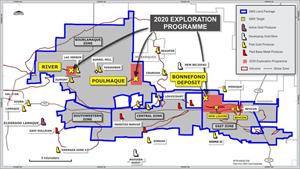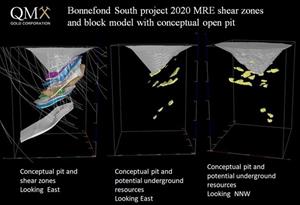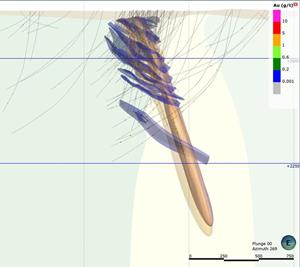QMX Gold Reports 53% Increase in Indicated Resources and 100% Increase in Inferred Resources at Bonnefond
TORONTO, Dec. 02, 2020 (GLOBE NEWSWIRE) -- QMX Gold Corporation (“QMX Gold” or the “Company”) (TSX:V:QMX) is pleased to report an interim update of its National Instrument 43-101: Standards of Disclosure for Mineral Projects (“NI 43-101”) resource estimate (the “2020 MRE”) on its Bonnefond South property, located approximately 25 km to the east of Val d'Or, Quebec (Figure 1). The 2020 MRE was completed independently by BBA Inc. in accordance with the NI 43-101 guidelines. A summary of the resource by zone is presented in Table 1. Since the last drill hole used for the 2020 MRE was finished, QMX has completed nearly 14,000 m of drilling on the Bonnefond property and is planning more exploration drilling during the winter.
Highlights include:
- An overall increase of 53% of the resources in the Indicated category
- An overall increase of 100% of the resources in the Inferred category
- A first underground resource of 140,600 oz @ 4.52 g/t Au, demonstrating the underground potential of the project – opening up a target zone between 350 m and 1,000m depth
- A new geological model with stronger control of the mineralized envelopes
“The QMX exploration team continues to build on its successes, not only reporting more than a 50% increase in resources in the indicated category and 100% increase in the inferred category, in this interim update at Bonnefond, but also demonstrated the underground resource potential below the pit shell,” states Brad Humphrey President and CEO of QMX Gold, “Drilling in 2020 set out considerable upside potential down to 1,000 metre depth and, I believe, our team will continue to build out the underground potential for some time to come.”
“We are very happy to have moved so many ounces from the inferred category into the indicated category,” comments Dr. Andreas Rompel, Vice President Exploration. “Furthermore we added a huge amount of resources for a potential underground mine as a result of the highly successful drilling campaign within the shear zones cross-cutting the tonalite intrusive. We are very confident about the Bonnefond deposit and will continue to build on this estimate during the next drill campaigns."
Table 1: Indicated and Inferred Mineral Resource Estimate
https://www.globenewswire.com/NewsRoom/AttachmentNg/45a5a4a6-7d80-4d22-8e08-8138cb195e96
Notes to Table 1:
- The independent qualified persons for the 2020 MRE, as defined by NI 43-101 guidelines, are Charlotte Athurion, P,Geo., and Pierre-Luc Richard, P. Geo., both of BBA Inc. The effective date of the estimate is October 31, 2020.
- These mineral resources are not mineral reserves as they have not demonstrated economic viability. The quantity and grade of reported Inferred resources in this MRE are uncertain in nature and there has been insufficient exploration to define these Inferred and Indicated resources as Measured; however, it is reasonably expected that the majority of Inferred Mineral Resources could be upgraded to Indicated Mineral Resources with continued exploration.
- The cut-off grade used for the Mineral Resource Estimate was 0.60 g/t Au for the open pit material, 2.70g/t for the underground material inside the V2 unit (where the mineralized orebody has a dip greater than 40°) and 3.4 g/t for the underground material outside the V2 unit (where the mineralized ore body has a dip lower than 40°). The cut-off grade was calculated using the following parameters (amongst others): Gold price = USD 1,450, CAD:USD exchange rate = 1.32, Mining cost = $110-150/t for underground and $3.50/t for open-pit, Processing cost = $26.50/t processed, G&A = $4.00/t processed for open-pit and $15.00/t for underground, Transportation cost = $5.00/t processed. The cut-off grade will be re-evaluated in light of future prevailing market conditions and costs.
- Resources are presented as undiluted and in situ for an open-pit and underground scenario and are considered to have reasonable prospects for economic extraction. The openpit resources are constrained within a pit shell that was developed via a pit optimization analysis using Hexagon’s MinePlan 3D software version 15.70. The pit optimization analysis was carried out using overall pit slopes of 50° in rock and 26.5° in overburden. A mining dilution of 5% and a mining recovery of 95% were considered. The pit shell that was selected for the Mineral Resource Estimate was the one that was run at a Revenue Factor (RF) equal to 1.2. Other parameters are the same as those that were used for the cut-off grade (see above). The openpit has a stripping ratio of 8.5 to 1.
- In order to determine the quantity of mineralization that shows a “reasonable prospect for eventual economic extraction” using underground mining methods, a series of clipping boundaries were created manually in longitudinal and 3D views to isolate potential mineable volume of blocks above the cut-off grades. When blocks below the cut-off grades were contained inside those volumes, they were included in the Mineral Resource estimate as internal dilution material. Isolated blocks or groups of blocks with not enough continuity to be considered as minable shapes were then removed from the mineral resource estimate.
- The MRE was prepared using Geovia® GEMS 6.8.3 and is based on 266 surface drillholes, of which 181 intercepted the block model limits, with a total of 30,639 assays. The resource database was validated before proceeding to the resource estimation. Grade model resource estimation was calculated from drillhole data using an OK interpolation method in a block model using blocks measuring 5 m x 5 m x 5 m in size. The cut-off date for drillhole assays was October 15, 2020.
- The model comprises 16 mineralized shear zones (which have a minimum thickness of 3 m), and two mineralized units (Tonalite and Diorite), each defined by individual wireframes.
- High-grade capping was done on the composited assay data and established on a per unit basis. Capping grades used are 1.5 g/t Au for the Diorite unit, 6 g/t Au for the Tonalite unit, and ranging from 2 g/t Au to 35 g/t Au for the shear zones. A value of zero grade was applied in cases of core not assayed.
- Fixed density values were established on a per unit and per mineralization type basis, corresponding to the median of the SG data of each unit ranging from 2.67 to 2.84. A fixed density of 2.00 g/cm3 was assigned to the overburden.
- The MRE presented herein is categorized as an Inferred and Indicated resource. The Inferred mineral resource category is defined for blocks that are informed by a minimum of two drillholes where drill spacing is less than 100 m. Indicated Mineral Resources were defined for the mineralization contained in the constraining pit shell only where blocks have been informed by a minimum of three drillholes and where drill hole spacing is less than 50 m. No indicated resource was defined for the underground resources. Where needed, some material has been either upgraded or downgraded to avoid isolated blocks.
- The number of metric tons (tonnes) was rounded to the nearest thousand.
- CIM definitions and guidelines for Mineral Resource Estimates have been followed.
- The authors are not aware of any known environmental, permitting, legal, title-related, taxation, socio-political or marketing issues, or any other relevant issues not reported in this Technical Report that could materially affect the Mineral Resource Estimate.
The Bonnefond deposit comprises an intrusive body and series of shear zones transecting the intrusive. The intrusive body has an elliptical shape on plan view, measuring approximately 250m by 95m and dipping at 70° to the north-east. The northern part of the intrusion is tonalitic body of 250m by 60m while the southern part of the intrusive is more dioritic in its mineral composition. The gold values are associated with free visible gold and disseminated pyrite mineralization; tension and shear quartz-tourmaline veins and stockwork
From a structural point of view, the Bonnefond deposit is characterized by an east-west shear system transitioning from less competent ductile volcanic facies to more competent facies within the intrusive. A series of mineralized shear zones dipping at 45° to the north transects the intrusive body being shallow on the southern side and deeper on the northern side of the intrusive. They extend through the dioritic part of the Bonnefond intrusive and display shallower dips inside the intrusive. As the tonalitic part of the intrusion is more competent, it suggests that it cracked under the pressure during the active structural phases, creating large flat enriched areas with abundant quartz tourmaline veins and veinlets and intense alteration.
QMX Gold started drilling on the Bonnefond intrusive in 2017 and realized its first major drilling program on the project in 2018. An initial openpit constrained resource was released in 2019 (Press release, July 30, 2019).
In order to build the 2020 MRE, QMX conducted 27,000 m of drilling to the Bonnefond deposit. 7,700 m of drilling was dedicated to definition drilling to convert resources in the inferred category to the indicated category in the open-pit and 19,300 m to explore under the 2019 conceptual open pit.
The successful drilling campaigns allowed the QMX team to substantially improve the geological and structural model of the deposit, particularly within the tonalite. The tighter drilling pattern allowed for a better definition of the mineralized envelope in the intrusive. Also, it was established that the shear zone extends through the tonalite, creating large shallow dipping mineralized envelopes within the intrusive (Fig 3). This better control of the mineralization inside the intrusive allowed the definition of continuous zones with higher grades. The extensive exploration drilling successfully demonstrated the presence of mineralization in several parts of the shear zones in the volcanic lithologies south of the intrusive, opening up a substantial target zone between 350 m and 1,000 m at depth.
Drilling on the Bonnefond property is still ongoing with three drill rigs. A 10,000 m exploration program was recently completed in the northern part of the property and results are pending. An additional exploration program is focused on the deep exploration on the intrusive and the shear zones following up on the results of DDH 121 (Press Release, August 18, 2020) and DDH 105A (Press Release, May 21, 2020) to increase the underground resources of the project.
Another 5,500 m exploration program is ongoing south of the Bonnefond deposit to test for western extensions of the New Louvre deposit (Figure 1).
Figure 1: QMX Val d’Or Camp
https://www.globenewswire.com/NewsRoom/AttachmentNg/64172a20-3f68-4650-904b-7da8fceb7334
Figure 2: Block model with conceptual open pit and underground resources.
https://www.globenewswire.com/NewsRoom/AttachmentNg/a0412470-7921-4950-8d15-1f283f6a8e30
Figure 3: Leapfrog 2020 Geological model, looking West.
https://www.globenewswire.com/NewsRoom/AttachmentNg/1b7218d0-418b-4780-acd1-1bd08b935873
The technical report related to the 2020 MRE will be filed on SEDAR at www.SEDAR.com within 45 days in accordance with the timelines set forth in 43-101.
2021 Winter Drilling Campaign – East Zone
Preparation and planning is underway for the 2021 winter drilling campaign. The campaign will focus largely on the East Zone, between the Bonnefond deposit and the past producing Bevcon Mine, on wet ground areas accessible only during the winter months. Weather dependent, QMX currently plans to utilize up to seven drill rigs for a total of 35,000 m over the winter months.
A large portion of the winter program will be on and around the Bevcon intrusive in order to follow up on the successful results from the 2019 drilling campaign. Highlights from the Bevcon Target include (Press Release September 24, 2019):
- DDH 17311-18-015 returned 84.8 g/t Au over 6.0 m, including 137.5 g/t Au over 3.7 m and DDH 17311-18-017 returned 10.8 g/t Au over 4.3 m.
This exploration program will also test a number of prospective exploration targets to the east of the Bonnefond intrusive.
Upcoming Events
Canaccord Genuity’s Val d’Or Day on December 8, 2020 at 11:00 am ET
QMX Gold is pleased to be a participant in Canaccord Genuity’s Val d’Or Day webcast. The discussion will include management teams from Agnico Eagle, Yamana Gold, Eldorado Gold, Wesdome Gold, Probe Metals and O3 Mining.
6ix Summit on December 9, 2020 at 10:00 am ET
QMX Gold’s management team will be participating in an Investor Summit hosted by 6ix on December 9 at 10:00 am ET. The presentation will be followed by a question and answer period. QMX Gold’s latest presentation will be available on the company website at https://www.qmxgold.ca/.
To register for this event go to www.6ix.com/browse-events/
RB Milestones Webinar on December 10, 2020 at 2:00 pm ET
QMX Gold will be hosting a live investor webinar on Thursday, December 10 at 2:00 pm ET. Brad Humphrey, President & CEO, Dr. Andy Rompel, Vice-President of Exploration and Melanie Pichon, Exploration Manager, will be providing an exploration update and reviewing the updated Bonnefond Resource. QMX Gold’s latest presentation will be available on QMX Gold’s website at https://www.qmxgold.ca/.
Register for this event at:
http://7514767.hs-sites.com/www.rbmilestone.com/qmx_webinar_event-12-10
Management will be available to answer your questions following the presentation on the webinar platform. You may also submit your questions directly to RB Milestones beforehand via email qmx@rbmilestone.com.
Quality Control
During the drilling program, assay samples were taken from the NQ core and sawed in half. One half is sent to Swaslab Ltd., a certified commercial laboratory. The other half of the core is retained for future reference. A strict quality assurance and quality control program was applied to all samples, which included insertion of mineralized standards, blank samples and duplicates inside each batch of 20 samples. The gold analyses were completed by fire-assay with an atomic absorption finish on 50 grams of material. Repeats were carried out by fire-assay with a gravimetric finish on each sample containing 5.0 g/t Au or more. The gold analyses were undertaken by fire-assay on 50 grams of pulp with an atomic absorption finish. Repeats were carried out by fire-assay with a gravimetric finish on each sample containing 5.0 g/t Au or more.
Qualified Persons
The scientific and technical content of this press release has been reviewed, prepared and approved by Mélanie Pichon, P.Geo, M.Sc, Exploration Manager, who is a "Qualified Person" as defined by National Instrument 43-101 - Standards of Disclosure for Mineral Projects ("NI 43-101").
The independent qualified persons for the 2020 MRE, as defined by NI 43-101 guidelines, are Pierre-Luc Richard, P. Geo., and Charlotte Athurion, P. Geo., of BBA Inc.
About QMX Gold Corporation
QMX Gold Corporation is a Canadian based resource company traded on the TSX Venture Exchange under the symbol “QMX”. The Company is systematically exploring its extensive property position in the Val d’Or mining camp in the Abitibi District of Quebec. QMX Gold is currently drilling in the Val d’Or East portion of its land package focused on the Bonnefond Deposit and in the Bourlamaque Batholith. In addition to its extensive land package QMX Gold owns the strategically located Aurbel gold mill and tailings facility.
| Contact Information: | ||
| Brad Humphrey | Sandy Noyes | Louis Baribeau |
| President and CEO | Investor Relations & Communications | Public Relations |
| Tel: (416) 528-5062 | Tel: (514) 667-2304 | |
| Toll free: +1 877-717-3027 | Email: info@qmxgold.ca | Website: www.qmxgold.ca |
Cautionary Note Regarding Forward-Looking Information:
This press release contains or may be deemed to contain “forward-looking information” within the meaning of applicable Canadian securities legislation. Forward-looking information includes, but is not limited to, statements regarding the 2020 MRE, future plans, operations and activities, planned drilling programs, projected mineralization, timing of assay results, and the ability of the Company to continue as a going concern. Generally, forward-looking information can be identified by the use of forward-looking terminology such as “plans”, “expects” or “does not expect”, “is expected”, “budget”, “scheduled”, “estimates”, “forecasts”, “intends”, “anticipates” or “does not anticipate”, or “believes”, or variations of such words and phrases or state that certain actions, events or results “may”, “could”, “would”, “might” or “will be taken”, “occur” or “be achieved”. Forward looking information is subject to known and unknown risks, uncertainties and other factors that may cause the actual results, level of activity, performance or achievements of the Company, its properties and/or its projects to be materially different from those expressed or implied by such forward-looking information, including but not limited to those risks described in the disclosure documents of the Company filed under the Company’s profile on SEDAR. Although the Company has attempted to identify important factors that could cause actual results to differ materially from those contained in forward-looking information, there may be other factors that cause results not to be as anticipated, estimated or intended. There can be no assurance that such information will prove to be accurate, as actual results and future events could differ materially from those anticipated in such statements. Accordingly, readers should not place undue reliance on forward-looking information. The Company does not undertake to update any forward-looking information, except in accordance with applicable securities laws.
Neither TSX Venture Exchange nor its Regulation Services Provider (as that term is defined in policies of the TSX Venture Exchange) accepts responsibility for the adequacy or accuracy of this release.




